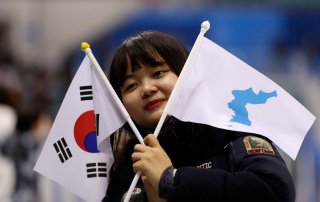Will Japan-South Korean Relations Ever Escape the Past?
The Japan–South Korea relationship has been in crisis for the past two years.
Here's what you need to remember: The logical underpinnings of the 1965 normalisation process — anti-communist sentiment, US Cold War strategic objectives, South Korean authoritarianism and Japanese economic interests — were institutionalised in the form of a treaty and evolved as guiding principles for bilateral cooperation. Over time this logic for cooperation has eroded, and the bilateral relationship has deteriorated accordingly.
The Japan–South Korea relationship has been in crisis for the past two years. 2019 was widely cited as the lowest ebb in bilateral relations since the countries established and normalized diplomatic ties in 1965.
How did they end up back at square one?
The logical underpinnings of the 1965 normalisation process — anti-communist sentiment, US Cold War strategic objectives, South Korean authoritarianism and Japanese economic interests — were institutionalised in the form of a treaty and evolved as guiding principles for bilateral cooperation. Over time this logic for cooperation has eroded, and the bilateral relationship has deteriorated accordingly.
Nevertheless, in Tokyo, the 1965 treaty remains at the forefront of foreign policy towards Seoul and is the primary institutional framework for dealing with mutual ‘history problems’. In Seoul the treaty has been delegitimised over recent decades, particularly within progressive circles and increasingly conservative ones too.
This process of delegitimisation has been driven by the rise of victim redress movements and the domestic lawsuits that are integral to their strategy. These lawsuits have challenged the legal foundations of the 1965 treaty, specifically its clause pertaining to compensation for colonial victims. The judicial efforts of Korean wartime labourers came to a head in 2019 when a South Korean court ruling on compensation essentially drove a dagger through the 1965 agreement.
The delegitimisation of the treaty in South Korea explains, in part, why the United States — the driving force behind the normalisation process and the architect of the logic undergirding it — has lost significant leverage over the Seoul–Tokyo relationship.
The structural context of the diplomatic crisis that Japan and South Korea face today can therefore be characterised as the crumbling of the 1965 normalisation regime. How can this dilemma be navigated by the two countries’ leaders?
Groupthink on Japan–South Korea relations remains trapped in the 1965 logic that the two countries, both allies of the United States, should get along for security reasons. This view has worn thin in Tokyo and Seoul. While it makes sense in theory, it discounts the reality that both governments weigh their respective positions on history problems above the potential benefits of enhancing trilateral security cooperation. Tokyo even prioritises the abduction issue over the matter of denuclearisation in its foreign policy towards North Korea.
Japanese officials will never entertain the idea of amending the 1965 treaty to reflect the changed political realities of the bilateral relationship. This was an approach they took vis-a-vis the United States in 1960, when they amended their security treaty to rectify significant points of contention. Tokyo has instead pinned the blame for the deterioration of the relationship with South Korea on President Moon Jae-in’s government and is hedging its bets for an improved bilateral relationship with Moon’s successor.
This interpretation of the relationship overlooks the fact that the South Korean judiciary has been steadily chipping away at the normalisation treaty since 2011, when the Constitutional Court in Seoul delivered a landmark judgement on the ‘comfort women’ issue. The court ruled it was unconstitutional of the South Korean government to make no tangible effort to procure compensation from Tokyo on behalf of the former ‘comfort women’. In other words, the judiciary ordered South Korean officials to dispute the 1965 settlement with Tokyo. Notably, this ruling was delivered under a conservative South Korean government, five years before President Moon came to power.
What the Tokyo–Seoul relationship requires is a pair of leaders who can establish a 21st century logic for cooperation, one that is not entrenched in the 1965 Cold War regional order. The foundation exists for this to occur. Both governments are pursuing a range of common objectives with bilateral and trilateral potential.
They are both developing hydrogen energy links and pursuing security cooperation with Australia and seeking to maintain regional stability amid intensifying China–US rivalry. They are also both trying to diversify their supply chains away from China and grappling with an unrelenting COVID-19 pandemic that has brought devastation to Southeast Asia — a region in which both are increasingly invested.
Tokyo and Seoul may choose to forego the synergistic effects of coordinating their policies and continue pursuing these common objectives in parallel. But this will become increasingly problematic for their mutual partners, given that Tokyo and Seoul will continue to be seated at the same multilateral diplomatic tables and, in the (increasingly probable) danger of a regional conflict, will be engaged on the same side. It is therefore in the national interest of both countries to seek to overcome their bilateral problems.
In addition to establishing a new logic for cooperation, there needs to be a pragmatic acceptance by leaders in both countries that their mutual ‘history problems’ will always occupy a place in the bilateral relationship.
Tokyo and Seoul need to establish some diplomatic mechanisms to relieve the ongoing anguish of the few surviving Korean colonial victims when their claims for justice and compensation resurface. This wouldn’t necessarily have to entail overturning or even undermining the 1965 treaty. It should involve creative diplomacy that is designed to deal with the growing political empowerment of colonial victims in South Korea and their continued leverage over the diplomatic relationship.
Lauren Richardson is a Lecturer in the Department of International Relations, The Australian National University.
This article was first published by the East Asia Forum.
Image Credit: Wikimedia Commons.

